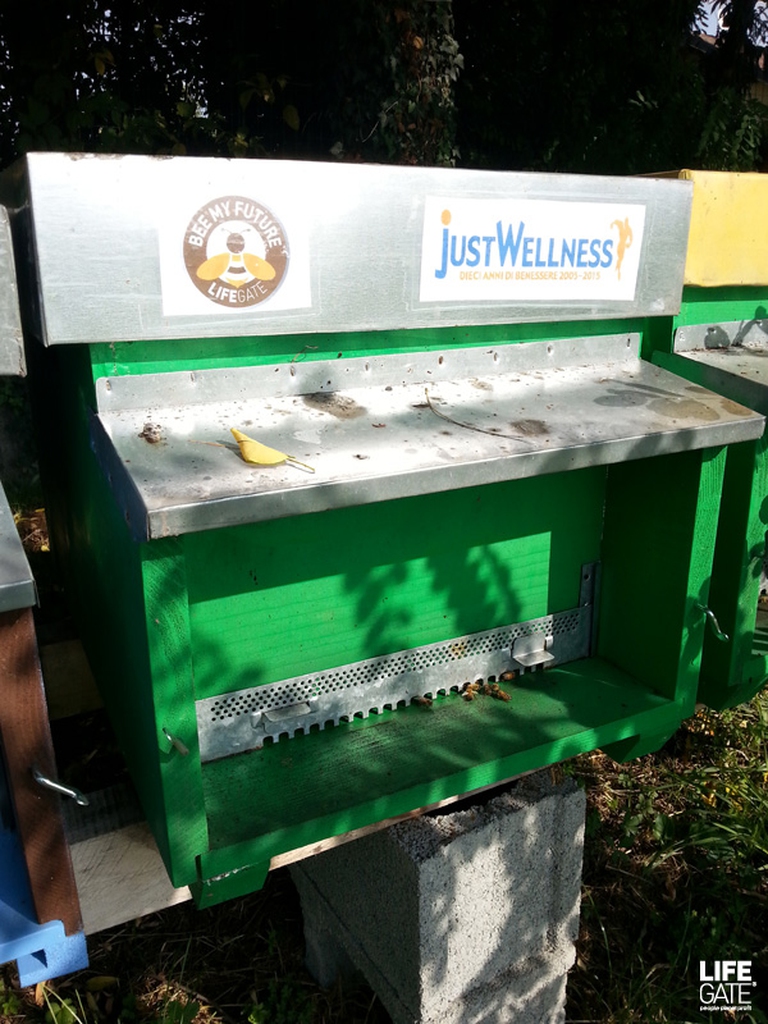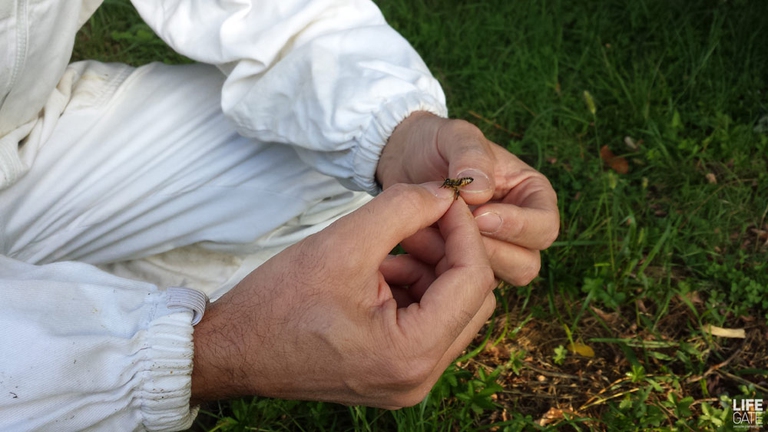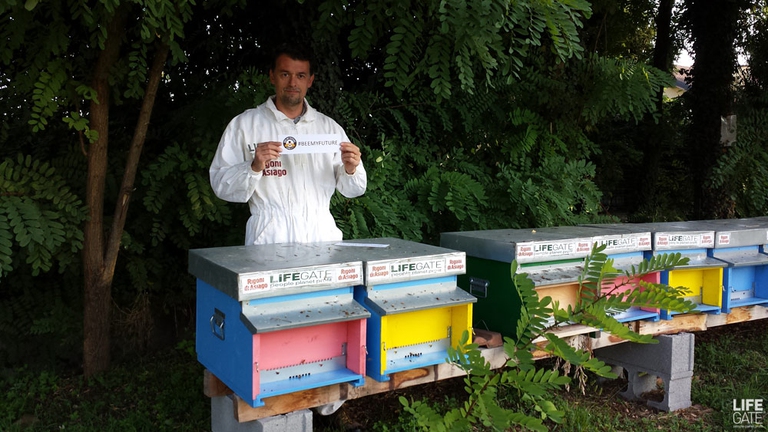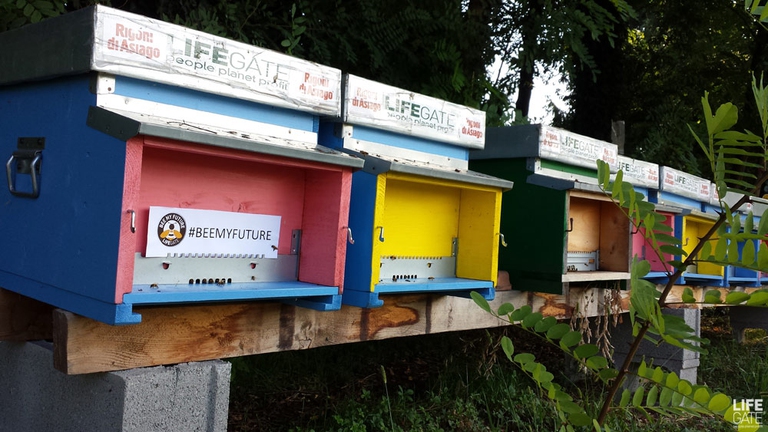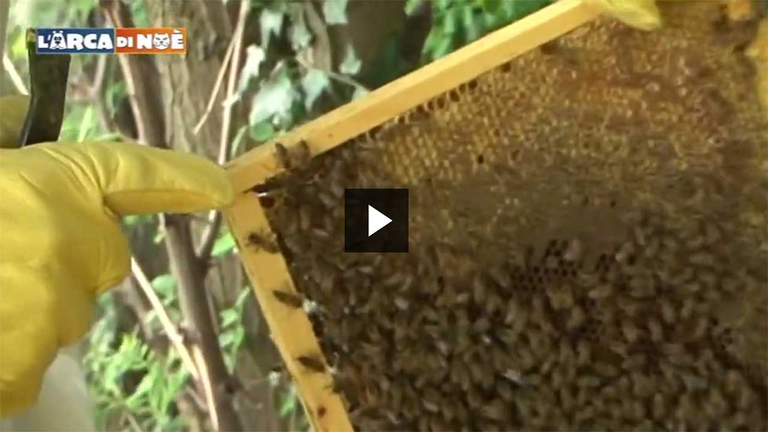The context
Over the past few years honeybee and other insect pollinator populations have fallen. According to the FAO, 71 out of 100 of the most important crops reproduce thanks to pollination. Over 80% of the crops that feed the human population depend on the free labour honeybees offer us. If the amount of honeybees keeps on decreasing we will no longer be able to enjoy many foods, such as berries, peaches, chestnuts, apples, almonds, as well as courgettes, tomatoes and many other vegetables. Fewer dairy products, such as milk, yoghurt, butter and fresh cheese will reach our tables. If honeybees disappear, our food security and future will be in danger.
Apitalia, the magazine dedicated to Italian beekeeping, has for many years highlighted the potential risks for beehives caused by the use of neonicotinoids, three types of pesticide that affect insects’ and pests’ nervous systems, together with the problems of habitat loss and environmental pollution.
That’s why sustaining beekeeping is fundamental for our food security and for our own and our planet’s future.
The project
Bee My Future aims to support the maintenance of 8 apiaries thanks to a beekeeper hobbyist who boasts ten years experience and a profound knowledge of the world of bees. Our partner, the Beekeepers’ Association of the Province of Milan (APAM), has selected the best beekeeper for the job.
APAM is a non-profit organization founded in 1982 with the aim of protecting honeybees and promoting beekeeping. The organisation works in the provinces of Milan, Lodi, Monza and in the Brianza area. It has over 170 members and more than 8,000 beehives.
The beekeeper will be entrusted with the management of honeybees. He will conduct beekeeping and honey production in the highly urbanised context of the province of Milan, following organic farming principles:
- Apiaries will be located, as far as possible, in areas of spontaneous crops and greenery that are not adjacent to areas subject to chemical treatments. Moreover, they will be at least 0.5 km away from areas subject to smog, such as motorways and streets of high density traffic, industrial plants and other sources of pollution.
- All materials utilised, including during hive construction, are natural. The project aims to demonstrate that apiary management in an urban area is possible without using synthetic substances for beekeeping and according to organic farming principles.
The project envisages the purchase of honeybee swarms and the necessary equipment to maintain them, such as hives and security clothing, technical assistance to the beekeeper, monitoring of the activities and the bees’ health, honey production according to the sector’s regulations (production, packaging, labelling), and branding of the project materials and honey.
LifeGate’s Bee my Future aims to support the maintenance of 8 apiaries thanks to an expert beekeeper hobbyist, selected by the Beekeepers’ Association of the Province of Milan (APAM). The beekeeper will be entrusted with the management of honeybees following organic farming principles. Apiaries are in fact located on the lands of the organic farm Azienda Agricola Biologica Terrafiera in Carugate, near Milan. It is the ideal place to protect bees from theft, which is always more frequent in Italy due to bees’ natural and economic value.
Lands cultivated with organic practices by Terrafiera ensure good health to our small, precious insects, which can thus pollinate in a healthy and safe environment.
Here you can find the profile of Marco Zucchetti and the images of the first months of work. The company Rigoni di Asiago has joined the project, becoming its first sponsor.
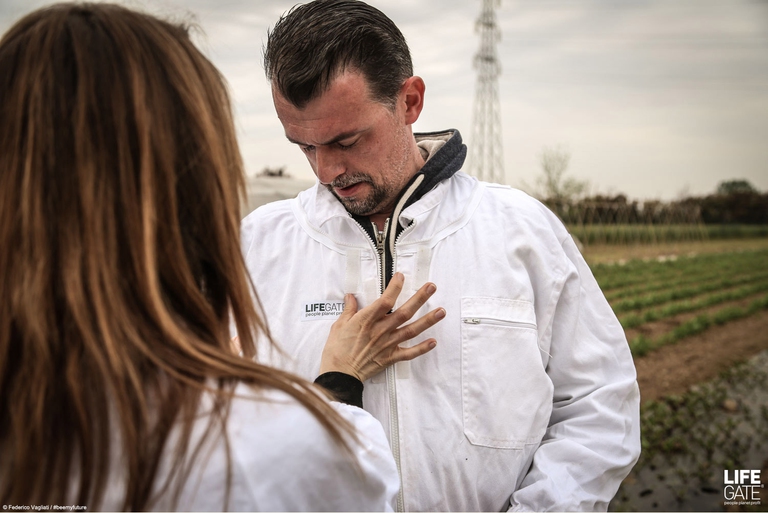
Who is Marco Zucchetti. He lives in the province of Milan, is 42, married and has 3 children. He works in a bank, in HR and technology, but his real passion is beekeeping. “I’ve always been fascinated by the world of bees. In 2005, by chance, I met a 75-year-old beekeeper who sold me 2 apiaries. I immediately realised that there was a whole brand new world to be discovered,” says Marco.
13 OCTOBER
Thanks to the contribution of Just Wellness, centre of customised physical activities of Cornaredo (Milan), Bee my Future now has 8 apiaries. In the meanwhile, the jars of honey are almost ready to be sent to all project’s supporters. Christmas gets closer, and LifeGate is designing incredible new things for your sustainable presents!
26 SEPTEMBER
Autumn has begun and so did preparations to face winter. Latest visit showed the state of conservation of bees and all precautions carried out by our beekeeper Marco Zucchetti for the months to come: from cleaning to apiaries’ preparation.
Such precautions are necessary to grant, during the coldest months, the right shelter and nourishment to our bees. However, some bold bees are taking advantage of these last few warm days to continue pollinating and producing honey.
Honey extraction will end in October. Then, the honey produced will be potted and distributed to all project’s supporters.
6 SEPTEMBER
The Italian TV programme dedicated to animals broadcasted during the newscast TG5 on Sunday, L’Arca di Noè, has hosted the Bee my Future project on 6 September. If you’ve missed it, click here to see it and share it!
6 JULY
Rigoni di Asiago, leader company in the organic food industry founded in 1922, has become the first company to join Bee my Future by adopting 6 apiaries, the same amount Elisa Rigoni started her entrepreneurial career with 90 years ago. LifeGate, thanks to the contribution of many supporters that showed their trust and interest in the project, decided to add the 7th apiary to celebrate the first 3 months of the initiative.
8 JUNE
The interest in the project aimed to protect bees, Bee my Future, is significantly increasing.

Honeycombs before extracting honey

The first honey jars

Honey tricling from the honeycomb

The honey deposited by bees in cells

The honey ready to be potted

Ready to pot

While the wax is being removed from honeycombs…

…honey trickles.

6 JUNE
The President of APAM, Ovidio Locatelli, hosted Marco Zucchetti and his apiaries in the firm “Apicoltura Locatelli”, making machineries for honey extraction available to the project Bee my Future.

The wax has been removed from the honeycombs and put in a specific centrifuge where honey has been collected and left to rest for a few days. Now the honey is ready to be potted.

The entire process has been monitored by LifeGate’s staff, and documented through the pictures of Federico Vagliati. We can then announce that the first honey of Bee my Future is ready and stored ahead of autumn, when it will be distributed to our supporters. The quality? A delicious acacia honey. The next honey extractions will produce other varieties, such as lime, mixed flower, and any kind bees will decide to pollinate according to their taste.
26 MAY 2015
Marco Zucchetti is the first beekeeper of the project Bee my Future, LifeGate’s challenge to safeguard bees in urban areas. We had a chat with him to understand how he embarked this journey and how it will develop. Read the full interview.
27 APRIL 2015
On Saturday 25 April, we visited Marco to see the first 5 apiaries of Bee my Future. He guided us in his world, showing us with great passion how each bee has a real specific role within their “kingdom”. Each task is precious, from worker bees to pollinators, from drones to the queen bee. We got the chance to see first-hand the importance of each step in the perfect mechanism an apiary is. Federico Vagliati, the photographer that decided to join the Bee my Future team, captured every moment.
22 APRIL 2015
A new queen bee is born in Marco’s apiaries. The former queen fled with her closest allies. They took shelter on a fruit tree. In this video you can see our brave beekeeper in a delicate operation to get back the dissident swarm.
How the story started
Marco dedicates his spare time to beebeeping, helped by unique collaborators: his wife, Federica, and his two daughters, Caterina, 10, and Martina, 6. His youngest kid, Tommaso, is only just a few months old. The little boy doesn’t have his own protection coverall yet, but he will surely soon join his family in the magic world of bees.
Marco, hobbyist beekeeper, has been chosen by APAM, association collaborating with Bee my Future, to be the first protagonist of this important initiative aimed to protect honeybees in urban contexts.
The experience. Marco boasts enviable experience and competences in this sector. He attended several courses on beekeeping and in 2012 he entered the official national register of experts of honey sensory analysis. He joined research projects on the causes of bee deaths and he organises honey tasting events. He is member of the Board of APAM.

The apiaries. The apiaries given by LifeGate and APAM will be kept from 1 April in his courtyard. The first phase envisages the purchase of swarms and equipment.

Every month, you can follow the works carried out by Marco and his family “struggling” with the safeguard of one of the planet’s most important species.
If you care about the future of food and biodiversity, join the project. Visit LifeGate’s store and help us save honeybees.

